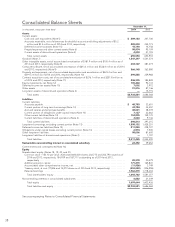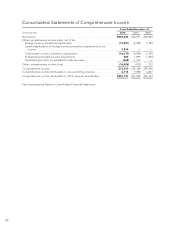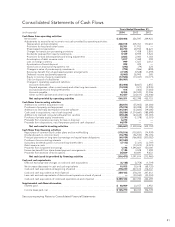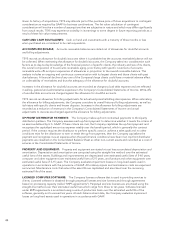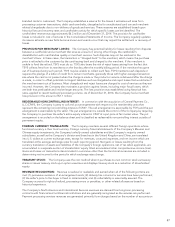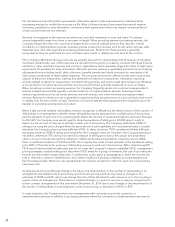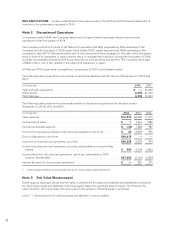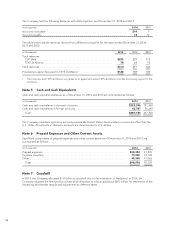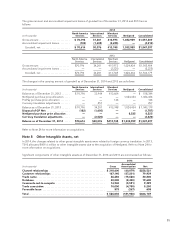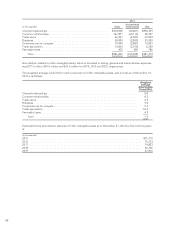NetSpend 2014 Annual Report Download - page 50
Download and view the complete annual report
Please find page 50 of the 2014 NetSpend annual report below. You can navigate through the pages in the report by either clicking on the pages listed below, or by using the keyword search tool below to find specific information within the annual report.branded cards to customers). The Company establishes a reserve for the losses it estimates will arise from
processing customer transactions, debit card overdrafts, chargebacks for unauthorized card use and merchant-
related chargebacks due to non-delivery of goods and services. These reserves are established based upon
historical loss and recovery rates and cardholder activity for which specific losses can be identified. The
cardholders’ reserve was approximately $6.3 million as of December 31, 2014. The provision for cardholder
losses is included in cost of services in the Consolidated Statements of Income. The Company regularly updates
its reserve estimate as new facts become known and events occur that may impact the settlement or recovery of
losses.
PROVISION FOR MERCHANT LOSSES: The Company has potential liability for losses resulting from disputes
between a cardholder and a merchant that arise as a result of, among other things, the cardholder’s
dissatisfaction with merchandise quality or merchant services. Such disputes may not be resolved in the
merchant’s favor. In these cases, the transaction is “charged back” to the merchant, which means the purchase
price is refunded to the customer by the card-issuing bank and charged to the merchant. If the merchant is
unable to fund the refund, TSYS must do so. TSYS also bears the risk of reject losses arising from the fact that
TSYS collects fees from its merchants on the first day after the monthly billing period. If the merchant has gone
out of business during such period, TSYS may be unable to collect such fees. TSYS maintains cash deposits or
requires the pledge of a letter of credit from certain merchants, generally those with higher average transaction
size where the card is not present when the charge is made or the product or service is delivered after the charge
is made, in order to offset potential contingent liabilities such as chargebacks and reject losses that would arise if
the merchant went out of business. Most chargeback and reject losses are charged to cost of services as they are
incurred. However, the Company also maintains a provision against losses, including major fraud losses, which
are both less predictable and involve larger amounts. The loss provision was established using historical loss
rates, applied to recent bankcard processing volume. As of December 31, 2014, the Company had a merchant
loss provision in the amount of $1.1 million.
REDEEMABLE NONCONTROLLING INTEREST: In connection with the acquisition of Central Payment Co.,
LLC (CPAY), the Company is party to call and put arrangements with respect to the membership units that
represent the remaining noncontrolling interest of CPAY. The call arrangement is exercisable by TSYS and the put
arrangement is exercisable by the seller. The put arrangement is outside the control of the Company by requiring
the Company to purchase the seller’s entire equity interest in CPAY at a put price at fair market value. The put
arrangement is recorded on the balance sheet and is classified as redeemable noncontrolling interest outside of
permanent equity.
FOREIGN CURRENCY TRANSLATION: The Company maintains several different foreign operations whose
functional currency is their local currency. Foreign currency financial statements of the Company’s Mexican and
Chinese equity investments, the Company’s wholly owned subsidiaries and the Company’s majority owned
subsidiaries, as well as the Company’s division and branches in the United Kingdom and China, are translated
into U.S. dollars at current exchange rates, except for revenues, costs and expenses, and net income which are
translated at the average exchange rates for each reporting period. Net gains or losses resulting from the
currency translation of assets and liabilities of the Company’s foreign operations, net of tax when applicable, are
accumulated in a separate section of shareholders’ equity titled accumulated other comprehensive income (loss).
Gains and losses on transactions denominated in currencies other than the functional currencies are included in
determining net income for the period in which exchange rates change.
TREASURY STOCK: The Company uses the cost method when it purchases its own common stock as treasury
shares or issues treasury stock upon option exercises and displays treasury stock as a reduction of shareholders’
equity.
REVENUE RECOGNITION: Revenue is realized or realizable and earned when all of the following criteria are
met: (1) persuasive evidence of an arrangement exists; (2) delivery has occurred or services have been performed;
(3) the seller’s price to the buyer is fixed or determinable; and (4) collectability is reasonably assured. The
Company accrues for rights of refund, processing errors or penalties, or other related allowances based on
historical experience.
The Company’s North America and International Services revenues are derived from long-term processing
contracts with financial and nonfinancial institutions and are generally recognized as the services are performed.
Payment processing services revenues are generated primarily from charges based on the number of accounts on
47



